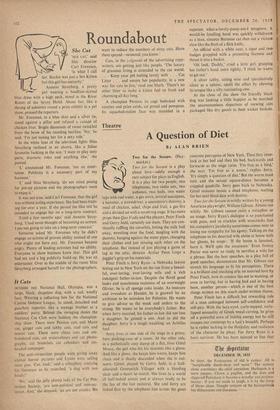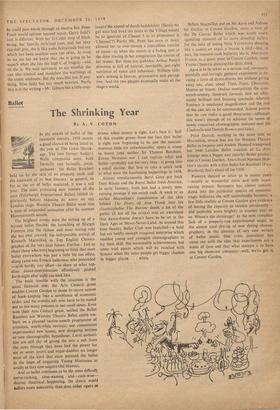Theatre
A Question of Diet
By ALAN BRIEN Two for the Seesaw. (Hay- ...4 r Two for the Seesaw is a play about love—oddly enough a rare subject for plays in English. e"--- It is a play for two people, two telephones, two radio sets, two iceboxes, two beds, two water taps with real water, a gas stove, several saucepans, a hammer, a screwdriver, a seamstress's dummy, a meal of chicken, salad, chips and fruit, a gas fire and a divided set with a revolving stage. It has more props than Quo Vadis and the players, Peter Finch and Gerry Jedd, certainly use them. They are con- tinually ruffling the coverlets, letting the milk boil away, wrestling over the food, tangling with the dummy, banging against the water pipes, changing their clothes and just missing each other on the telephone. But instead of just playing a game of tag in the attic, director Arthur Penn keeps a juggler's grip on his materials.
Peter Finch is Jerry Ryan—a Nebraska lawyer hiding out in New York on the run from a beauti- ful, over-loving, ever-loving wife and a rich indulgent father-in-law. Despite the florid good looks and muscleman maleness of an overweight Olivier, he is all sponge cake inside. As insecure and irresolute as Hamlet, he is gnawed by an ambition to be mistaken for Polonius. He wants to give advice to the weak and orders to the strong. He wants to be everybody's father. But when Jerry married, his father-in-law did not lose a daughter, he gained a son. And so did the daughter. Jerry is a tough weakling, an Achilles heel.
Jerry lives at one side of the stage in a grimy, bare packing-case of a room. At the other side, in a pathetically cosy dump of a flat, lives Gittel Mosca, the girl who fits his neurosis like a glove. And like a glove, she keeps him warm, keeps him clean and is finally discarded when she is out- worn. Gittel, played by Gerry Jedd, is a half- educated Greenwich Villager with a bleeding ulcer and a heart to match. She lives in a world of half-baked artists and is always ready to be the lay of the last minstrel. She and Jerry are linked first by the telephone line across the great concrete porcupine of New York. Then they inter- lock in her bed and then his bed, backwards and forwards as the stage turns. 'I'm free as a bird,' she says. `I'm free as a worm,' replies Jerry. `It's simply a question of diet.' But the worm must turn and the sexual square-dance becomes a crippled quadrille. Jerry goes back to Nebraska. Gittel remains beside a dead telephone, waiting for her next blind date with destiny.
Two for 11w Seesaw is wittily written by a young American playwright, William Gibson. Almost too wittily. Mr. Gibson cannot resist a metaphor or an image. Jerry Ryan's dialogue is so punctuated with puns, and so crackles with wisecracks that his compulsive jocularity sometimes comes near to losing our sympathy for his agony. Talking on the telephone to his deserted wife alone at home with her ghosts, he snaps: `If the house is haunted, burn it. We'll split the insurance.' Even Jimmy Porter was never so ready to sacrifice a wife for a phrase. But the best speeches, in a play full of good speeches, demonstrate that Mr. Gibson can stretch his language to fit his perceptions. There is a brilliant and touching aria on married love by Peter Finch, how its essence lies not in wanting, or even in having, but in having had and in having been, another person—which is one of the best things written on this much under-written theme.
Peter Finch has a difficult but rewarding role of a man unhinged between self-confidence and self-pity. With the lazy-eyed, curly-topped, surly- lipped sensuality of Greek wood carving, he gives off a powerful aura of hidden energy but he still escapes our contempt by a hair's breadth. Perhaps he is rather lacking in the flexibility and resilience of the character he plays. For Jerry Ryan is a born survivor. He has been minced so fine that he could pass whole through an electric fan. Peter Finch would splinter beyond repair. Gerry Jedd's task is different. With her 0-Cedar mop of black string, her heavily italicised eyes, and her sexy rag-doll grin, she is like sothe homemade bed-toy which has been overlain once too often. As soon as we see her we know that she is going to be superb when she hits the high C of tragedy—and so she is. We wait nervously to see whether she can also control and modulate the warblings of the comic soubrette. But she does that too. If any- thing, Miss Jedd has too much bravura. Partly this is in the writing—Mr. Gibson has a little over- loaded the appeal of dumb beddability. (Surely no girl who had lived ten years in the Village would be so ignorant of Chanel 5 as to pronounce it `Channel'?) Partly Mr. Penn has once or twice allowed her to over-stretch a marvellous routine of mime—as when she stands in a fading spot at the door tracing in her imagination the retreat of her wooer. But these are quibbles. Arthur Penn's direction is full of natural, inevitable, just-right subtleties of voice and behaviour. William Gib- son's writing is literate, provocative and percep- tive. And the two players eventually make all the stage a world.



























 Previous page
Previous page